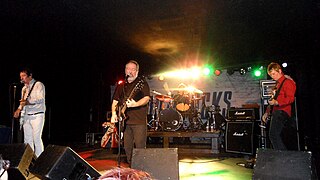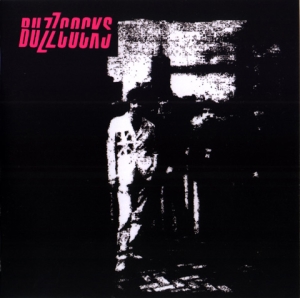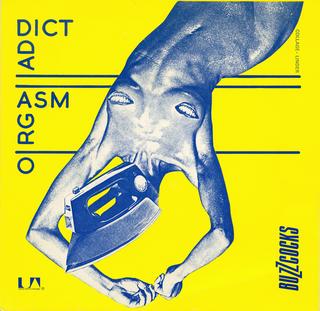Related Research Articles

Buzzcocks are an English punk rock band that singer-songwriter-guitarist Pete Shelley and singer-songwriter Howard Devoto formed in Bolton in 1976. During their career, the band combined elements of punk rock, power pop, and pop punk. They achieved commercial success with singles that fuse pop craftsmanship with rapid-fire punk energy; these singles were later collected on Singles Going Steady, an acclaimed compilation album music journalist and critic Ned Raggett described as a "punk masterpiece".

Howard Devoto is an English singer and songwriter, who began his career as the frontman for punk rock band Buzzcocks, but then left to form Magazine, an early post-punk band. After Magazine, he went solo and later formed indie band Luxuria.

Pete Shelley was an English singer, songwriter and guitarist. He formed early punk band Buzzcocks with Howard Devoto in 1976, and became the lead singer and guitarist in 1977 when Devoto left. The group released their biggest hit "Ever Fallen in Love " in 1978. The band broke up in 1981 and reformed at the end of the decade. Shelley also had a solo career; his song "Homosapien" charted in Australasia and Canada in 1981 and 1982.

"London Calling" is a song by the British punk rock band the Clash. It was released as a single from the band's 1979 double album of the same name. This apocalyptic, politically charged rant features the band's post-punk sound, electric guitar and vocals.

Another Music in a Different Kitchen is the first studio album by the English punk rock band Buzzcocks. It was released in March 1978 by the United Artists record label. This was the third line-up of Buzzcocks, with the guitarist Pete Shelley singing following the departure of the original vocalist Howard Devoto and then the firing of the bass guitarist Garth Smith. The album includes the single "I Don't Mind", which reached number 55 in the UK Singles Chart in May 1978.

Singles Going Steady is a compilation album by English punk rock band Buzzcocks, first released on I.R.S. Records in the United States on 25 September 1979.

Homosapien is the second solo album by British musician Pete Shelley, released in 1981. The album follows his experimental instrumental album Sky Yen and his work with the group Buzzcocks, who initially disbanded in 1981. Homosapien saw a marked departure from the punk stylings of Buzzcocks' records, being heavily influenced by the programmed synthesizer sounds and drum machines of synthpop, with the addition of Shelley on acoustic guitar. The title track was released as a UK single and was banned by the BBC due to explicit homosexual references, but was nevertheless a hit in several other countries.

All Set is the fifth studio album by English pop punk band Buzzcocks. After standardising their line-up of vocalists and guitarists Pete Shelley and Steve Diggle, bassist Tony Barber, and drummer Phil Barker for the band's previous album Trade Test Transmissions (1993), the band's first record since their reunion in 1989, the band toured relentlessly which inspired the band–especially Shelley–to create a new album. Hiring longtime punk rock producer Neill King to produce and engineer All Set, the band recorded in Fantasy Studios, Berkeley, California, a studio where then-huge pop punk bands like Green Day, to whom Buzzcocks had been a big influence, had recently recorded music engineered by King.

Modern is the sixth studio album by English pop punk band Buzzcocks. After the critical success of the band's previous album All Set (1996), the band became disillusioned with trying to be a rock band and set out to become more "modern," thus birthing the project. Recording the album in Chipping Barnet with the band's bassist Tony Barber producing, Modern sees a strong electronic music influence, with electronic instruments and drum machines featuring on the songs, especially those written by Steve Diggle, who wrote five of the album's songs whilst Pete Shelley wrote the other eight songs.

Stephen E Diggle is an English musician best known as a guitarist and later lead vocalist in the punk band Buzzcocks.

Buzzcocks is the seventh studio album by English pop punk band Buzzcocks. It was released on 18 March 2003 by record label Merge in the US and Cherry Red in the UK.

Love Bites is the second studio album by English punk rock band Buzzcocks. It was released on 22 September 1978, through United Artists Records.

Trade Test Transmissions is the fourth studio album by English pop punk band Buzzcocks. It was released on 2 June 1993 by record label Castle Communications on their sub-label Essential Records and was the band's first release in fourteen years, following up 1979's A Different Kind of Tension. The music was quite different from their earlier material with nods to the power pop scene popular at the time.

Operators Manual: Buzzcocks Best is a compilation album by English punk rock band Buzzcocks. It was released in 1991 by I.R.S. Records.

Spiral Scratch is an EP and the first release by the English punk rock band Buzzcocks. It was released on 29 January 1977. It is one of the earliest releases by a British punk band. Spiral Scratch and the album Time's Up are the only Buzzcocks studio releases with original singer Howard Devoto, who left shortly after the EP's release to form one of the first post-punk bands, Magazine.

"Orgasm Addict" is a song by the English punk rock band Buzzcocks. It was the A-side of the Buzzcocks' first single, with "What Ever Happened To?" as the B-side, which was released on 4 November 1977 by record label United Artists.

"Shot by Both Sides" is a song written by Howard Devoto and Pete Shelley, and performed by the English post-punk band Magazine. It was released in January 1978 as the band's first single, reaching No. 41 on the UK Singles Chart and appearing, a few months later, on their debut album Real Life. The song has been cited as a seminal work of the post-punk genre, as well as a pop punk and new wave.

XL1 is the second solo album by Buzzcocks frontman Pete Shelley. It was released in 1983 and reached number 42 in the UK Albums Chart, remaining in that listing for four weeks. The single "Telephone Operator" charted at No. 66 in the UK Singles Chart, making it his biggest single release there. The original release was packaged with a computer program for the ZX Spectrum which displayed lyrics and graphics in time with the music.

"Ever Fallen in Love (With Someone You Shouldn't've)" is a 1978 song written by Pete Shelley and performed by his group Buzzcocks. It was a number 12 hit on the UK Singles Chart and was included on the album Love Bites.

Sky Yen is the first album recorded by English musician Pete Shelley, recorded in March 1974 and released by his label Groovy Records in April 1980. It is Shelley's earliest known recording, and was created when he was in college. After developing an interest in electronic music, Shelley created a single electronic oscillator with an added potentiometer, and recorded the album on the device in his living room while utilising a two-track stereo recorder. The entirely electronic album is experimental in style, and emphasises oscillations and drone characteristics.
References
- 1 2 "The Quietus | Features | A Quietus Interview | I Hate Finishing Things When I Don't Have To: Pete Shelley Interviewed". The Quietus. Retrieved 2018-12-11.
- ↑ McGartland 9.
- ↑ Tennant, vi
- ↑ "'You Know Me': Buzzcocks' Pete Shelley Gave Punk A Heart". NPR.org. Retrieved 2018-12-11.
- ↑ Lynskey, Dorian (2007-06-29). "Readers recommend: songs about homosexuality". The Guardian . Retrieved 2016-06-06.
- ↑ Hilderbrand 429.
- ↑ "BBC TV - Punk and New Wave Years with Annie Nightingale" . Retrieved 20 November 2020.
- ↑ Green, Jim (February 1982). "Green Circles". Trouser Press . Vol. 8, no. 12. New York. p. 44. Retrieved May 27, 2024.
- ↑ Hilderbrand 417.
- 1 2 Hilderbrand 415.
- 1 2 3 Hilderbrand 428.
- ↑ Youngs, Ian (7 December 2018). "The story of Buzzcocks' pansexual punk anthem". BBC News. Retrieved 23 August 2020.
- ↑ Kent, David (1993). Australian Chart Book 1970–1992 . St Ives, NSW: Australian Chart Book. ISBN 0-646-11917-6.
- ↑ "RPM Top 50 Singles - July 3, 1982" (PDF).
- ↑ "The Official New Zealand Music Chart Top 40 Singles - 28 March 1982". Recorded Music NZ. Retrieved 2018-12-08.
- ↑ "National Top 100 Singles for 1982". Kent Music Report. 3 January 1983. Retrieved 22 January 2023– via Imgur.
- ↑ "RPM Top 100 Singles of 82 - December 25, 1982" (PDF).
Sources
- Hilderbrand, Lucas (2013). ""Luring Disco Dollies to a Life of Vice": Queer Pop Music's Moment". Journal of Popular Music Studies. 25 (4): 415–438. doi:10.1111/jpms.12044.
- McGartland, Tony (2017). Buzzcocks - The Complete History. Bonnier Zaffre. ISBN 978-1786062741.
- Neil Tennant (1 November 2018). One Hundred Lyrics and a Poem (1 ed.). Faber & Faber. ISBN 978-0571348909.